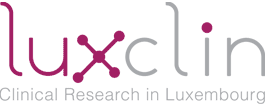

In August, HRH Princess Tessy of Luxembourg spent two weeks at the Luxembourg Institute of Health (LIH) for a training period related to her Master’s studies. A tour through all three departments gave her the opportunity to get an overview on LIH’s research activities and their relevance for scientific progress and healthcare. In an interview with the Communication Unit, Tessy of Luxembourg tells about her impressions.
‘I am currently doing a Master’s in International Studies and Diplomacy at the School of Oriental and African Studies of the University of London. I aim to write my Master’s thesis on the subject of bioterrorism, meaning the use of toxins or infectious agents as weapons. For this, I need to gather information from many different sources. My studies are rather theoretical. As I really missed a practical part, I decided to collect information for my thesis by doing traineeships in different institutions and organisations in Luxembourg and other countries.
I aimed to acquire a more profound knowledge on infectious agents and diseases as well as on the human immune response. At the LIH, many research activities focus on unravelling disease mechanisms, understanding drug resistance and developing new treatment options. I thought it was the perfect place to gather all necessary information in a direct exchange with researchers and technical staff. So, this was the reason why I applied for a short training period.’
‘During my two-week stay, from 3rd to 7th and from 24th to 27th August, I had the opportunity to visit all sites of the institution and to discover the research topics of the three departments: Infection & Immunity, Oncology, and Population Health. I met the CEO, the directors of department and numerous staff members. I felt honoured that so many people readily adapted their schedule and took the time to explain their function and research scope to me. My daily programme was well-organised and intense, and included hands-on training.
It is fascinating to discover the world of research. Before, I was not aware of the complexity of research projects. Scientists really have to focus on the detail and dig deep to get the answer to their questions, especially in molecular biology. I was impressed by the extensive specialised knowledge of the people I met. Each subject I was told about appeared highly interesting to me.’
‘My stay at the LIH gave me an overview on most of the research activities. I was not only introduced to infectiology and immunology but as well to a wealth of biomedical and clinical research projects. I welcomed this, as I am always very eager to extend my general education. I will be able to integrate part of the newly gained knowledge into my Master’s thesis. All was truly enriching and can surely be valorised elsewhere in my studies or professional life in the future.’
‘Difficult to say, I was captivated by the work that is done on allergies, hepatitis B, AIDS and by the concept of personalised medicine. Regarding the laboratory equipment, the National Cytometry Platform particularly impressed me. It has various big machines for cell analysis and sorting, and the team has a very strong expertise in the technology.
The most remarkable research project that was presented to me was the EpiPath study, which investigates the effect of childhood adversity on health. I was surprised to learn and also concerned as a mother, that a trauma experienced during early childhood can cause changes in gene expression leading later on to a higher risk for certain diseases. A research nurse showed me all the examinations that are carried out on study participants such as a stress test, a psychological questionnaire and collection of saliva samples.
Researchers at LIH truly address challenging questions. I think research institutions should communicate much more on their projects. It is key to use the right vocabulary to make the subjects comprehensible, not only to the general public but also to political decision makers in order to convince them about the impact. In my view, the consultation between scientists and politicians should be reinforced.’
.jpg)
Photos:
1. Tessy of Luxembourg meeting Prof Saverio Stranges (right), director of the Department of Population Health, and Prof Ngianga-Bakwin Kandala (left), head of the Health Economics and Evidence Synthesis Research Unit
2. Tessy of Luxembourg with the team of the Clinical and Epidemiological Investigation Centre (CIEC)
3. Tessy of Luxembourg discussing with Prof Markus Ollert, director of the Department of Infection & Immunity
4. Tessy of Luxembourg with CEO Dr Jean-Claude Schmit
for articles/videos/studies
Healthcare professionals who wish to be part of a unique network, providing access to up-to-date, accurate and validated information about clinical research.
Investigators and study staff who wish to be part of a unique network, in order to stay abreast of clinical trials taking place in Luxembourg and who are willing to further develop their competencies.